Practical strategies for taking back control of what you eat and when
Last week, I asked our Facebook community what Habit of Disease was the most challenging to overcome. The answer was overwhelmingly emotional eating, so I wanted to dedicate this week’s blog post to thoroughly exploring the roots of emotional eating and give you practical strategies for taking back control of what you eat and when.
Learning better ways to cope with eating that’s driven by emotion may be one of the most important factors in creating lasting health. Research at the Miriam Hospital’s Weight Control & Diabetes Research Center compared a group of individuals who reported eating due to internal factors (such as loneliness, for self-comfort, or as a reward) to those motivated to eat by external factors (such as a party or holiday gathering). The emotional eaters, according to the study that was published in Obesity in 2007, lost less weight over time and experienced more weight gain.
Why emotional eating is so difficult to overcome
So the problem is serious. But what makes emotional eating so difficult to overcome? Well, it comes down to how food plays into the reward part of habit loops.
Our habits are deeply rooted automated feedback loops. In fact, over 40 percent of our daily actions are unconscious, freeing our minds to address more urgent issues of survival. Though we evolved to internalize routine tasks as a means of self-preservation, the technologically advanced society of today means that we spend less time in danger, making our old hardware a potential liability if we internalize and automate the wrong tasks.
In the beginning, when you are presented with a situation or a task, you decide what you want in any specific situation. Later, once you have done it a few times and the basal ganglia has processed it, you stop actively thinking about the task and it becomes automatic. After that, it only needs a cue and your brain’s subroutines will ferry you through the task with very little thought as long as there is some reward to reinforce the behavior.
Reprogramming Habits of Disease
Here’s how it works. Your mind identifies a cue, triggering an automatic routine that is reinforced with a satisfying reward. It starts as simply as this: You see a candy bar (cue); you purchase, unwrap, and eat the candy bar (routine); and you get a great-tasting treat (reward).
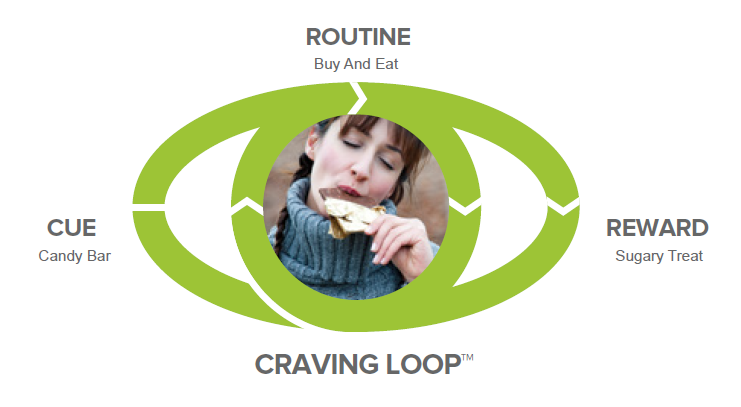
Once our brain learns that a candy bar is a delicious, sugary treat, the very sight of the candy bar creates an anticipation of the sugar high. If we do not get it, we are disappointed. Over time, as we experience the repeated high from the treat, we start craving the high from eating a candy bar. You now have created a loop that can be quite powerful and totally unconscious!
Emotionally charged habit loops
Let’s look at a habit loop that is more emotionally charged. Imagine that you’ve come home from a long day of work. You are mentally exhausted from the stress of your job, so you sit down on the couch and turn on the television to wash the stress away in a binge marathon of your favorite shows.
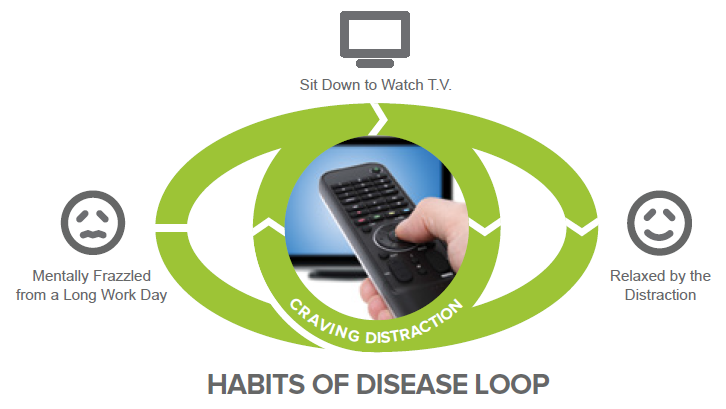
In this loop, you are responding to stress with a routine that produces a relaxing reward. Like emotional eating, the reward comes at the cost of your health as long periods of inactivity lead to a host of health complications. The simplest of rewards can morph into powerful habits, for better or for worse. And once a craving for it occurs, it takes some work to correct.
If we can rationalize the importance of exercise and help you to find something you are willing to try, we can build on your body’s natural tendencies to form habits. Returning to our television example, we know that we are seeking the reward of relaxation. Watching television is simply one way to get to that reward, but there are others. So let’s switch out the unhealthy routine with one that is more active.
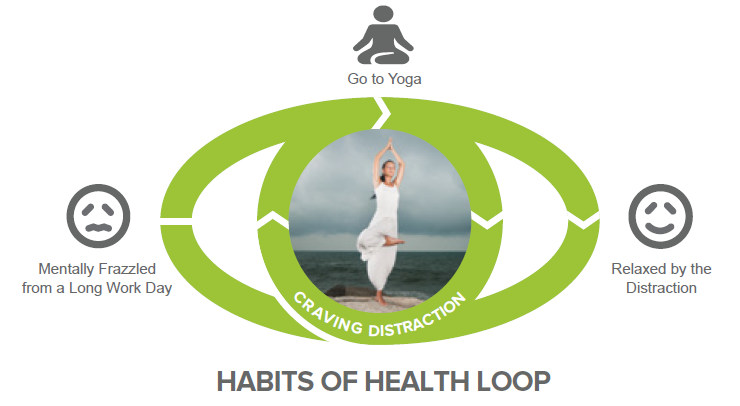
In this new habit loop, we have replaced watching television with going to yoga, which results in the same reward: relaxation. Yoga may not be the routine that works for you. Perhaps you go for a walk or a jog, or maybe you go to Zumba or kickboxing. As long as we are replacing the Habit of Disease of with a Habit of Health, we are on the right track.
Conquering Emotional Eating
Now that you have a better idea of how your habits work, we can begin to identify the habits tied to emotional eating. For many Americans, one of the biggest sources of negative emotion is our work. A bad day at the office can lead to snacking at our desks and heaping servings of ice cream when we get home. This, like our television example, is a habit loop, and we can reprogram it.
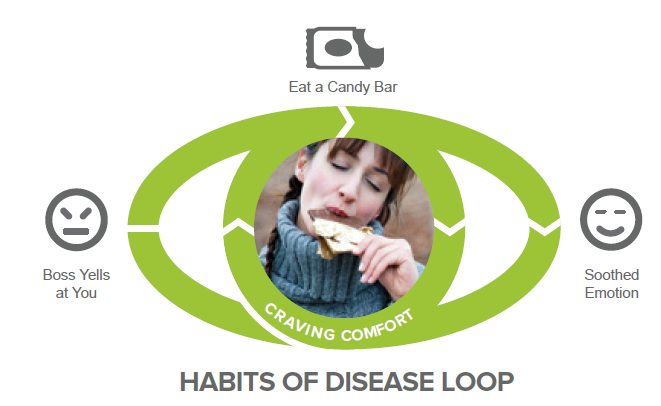
Since you might not be able to go for a walk or jump into a yoga class to relieve your stress in the middle of the day, we prepare a routine that can relieve your stress without requiring you to leave your desk. In these situations, my favorite thing to do is a basic breathing exercise. I take a few minutes to breathe in and out slowly, focusing entirely on my own breathing.
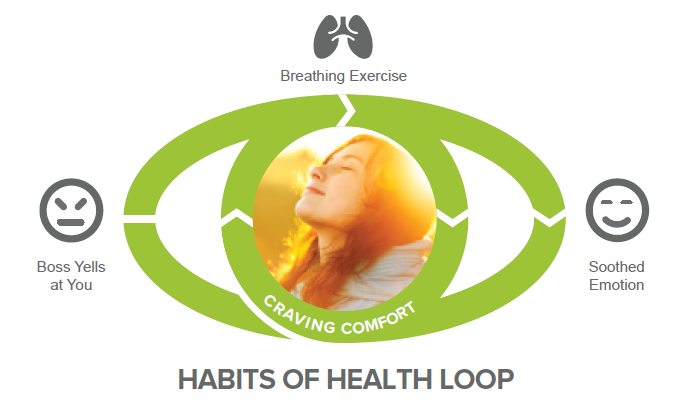
The more you understand how habits work, the more you will identify habit loops in your own life. Even if you pause for a few minutes right now, you could probably write down the cues that most commonly trigger your emotional eating response. Becoming more mindful of these cues is the first step. Working to replace your routines with healthier alternatives is the second step.
I wish that this process was easy, but in truth the process of rewiring the way you respond to your environment can be challenging and at times uncomfortable. You are likely to uncover habit loops that you have reinforced for decades, so don’t be too hard on yourself if you do not change overnight.
Continue to work at it every day, and follow these tips:
- Use the Stop. Challenge. Choose. method. When you identify the cue for a Habit of Disease, stop. Take a deep breath. Challenge yourself to choose a Habit of Health instead.
- Don’t do it alone! Talk to your health coach about strategies for overcoming emotional eating or ask a close friend to hold you accountable to your goals.
- Stack the deck in your favor. If your habit is to come home and eat ice cream, stop buying ice cream. Making unhealthy options less convenient can make it easier for you to make the healthier choice when times are tough.
- Keep a journal. At the end of each day, reflect on the choices that you made and identify your triumphs and challenges. This will help you to become more mindful of your opportunities to forge Habits of Health.
- Ask for help. The Optimal Health community is ready and waiting to answer your questions. These are people like you that understand the difficulties you’re facing. They can help. Click here to visit today.